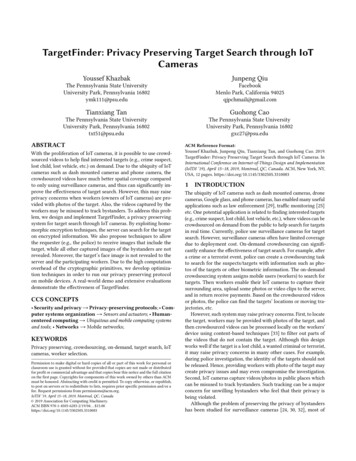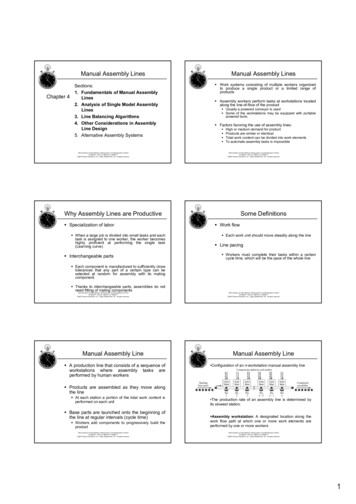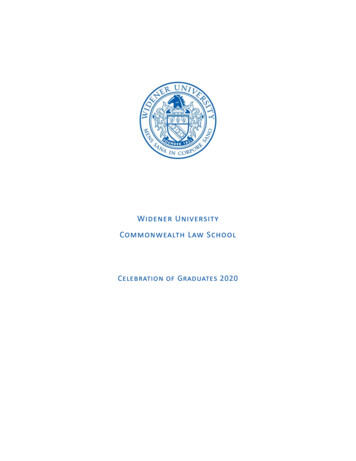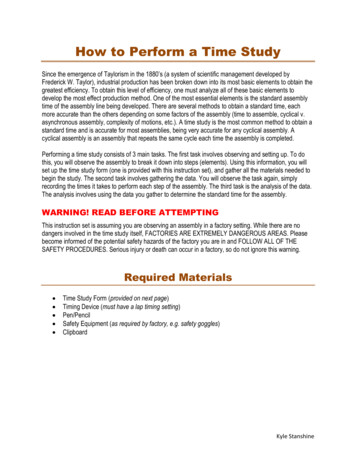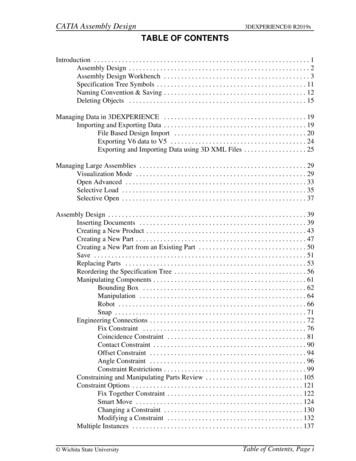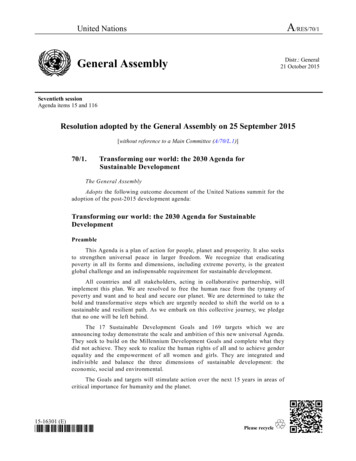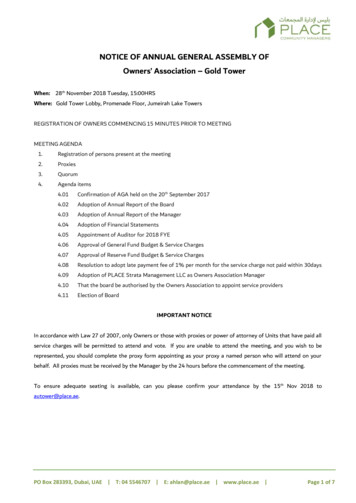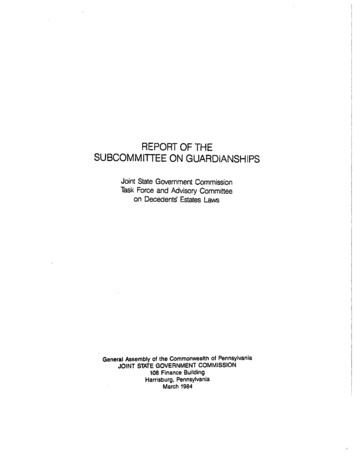
Transcription
REPORT OF THESUBCOMMITIEE ON GUARDIAI\JSHIPSJoint State Government CommissionTask Force and Advisory Committeeon Decedents' Estates LawsGeneral Assembly of the Commonwealth of PennsylvaniaJOINT STATE GOVERNMENT COMMISSION108 Finance BuildingHarrisburg, PennsylvaniaMarch 1984
Subcommittee on GuardianshipsWilliam McC. Houston, Esq.ChairmanJerome B. Apfel, Esq.Honorable Anthony R. AppelHonorable Hugh C. BoyleEdward P. Carey, Esq.Leonard J. Cooper, Esq.Russell S. Endo, Esq.Professor Lawrence A. FrolikG. Donald Gerlach, Esq.Roberta J. KearneyEva E. KeppMary Ellen McMillenFrank J. OliverRobert E. Rains,·Esq.William C. Ries, Esq.Terry Roth, Esq.Margaret RubinDean John J. SciulloLarry B. Selkowitz, Esq.J. pennington straus, Esq.-ii-
ContentsI.II.III. . · ··GUARDIANSHIP PROPOSALS: 1973 to 1983···LEGISLATIONCommonwealth Guardianship Office Limited Guardianship . . · · ··· ·INTRODUCTION. . ······ · ···· ·APPENDIXPublic Guardian Law--Other States Limited Guardianship Law--Other States -iii-1715223344
I.IntroductionAt the May 13, 1983 meeting of the Joint StateGovernment Commission's Task Force and Advisory Committeeon Decedents' Estates Laws, George J. Hauptfuhrer Jr.,Esq., chairman of the advisory committee, established heSubcommittee on Guardianships to review several proposalswhich had been presented to the advisory committee toamend various aspects of Pennsylvania guardianship law.This subcommittee report to the advisory committeesummarizes the work and presents the recommendations ofthe subcommittee.While this report will be formally submitted to theadvisory committee at its next meeting, it is theintention of several members of the General Assembly tointroduce the legislation recommended by the subcommitteein this report prior to review by the task force and dvisorycommittee.This report is being distributed atthis time to facilitate legislative consideration of theproposals.-1-
During 1973-74, Mr. Hauptfuhrer served as chairmanof the advisory committee's Subcommittee on Persons underDisability, which participated in the drafting of legislation incorporating the concepts of limited guardianshipand public guardians into Pennsylvania law (see part II).While the Pennsylvania General Assembly after more than tenyears of debate has not adopted either concept, the 43states listed in the following table have enacted limitedguardianship statutes and 39 states have made provision forpublic guardians.Appendix A contains a summary of thestatutes of each of these states.Mr. Hauptfuhrer appointed advisory committee vicechairman, William Mce. Houston, Esq., as chairman of theSubcommittee on Guardianships and suggested that personsinterested in the issues before the subcommittee who werenot members of the advisory committee be invited to serveon the subcommittee.As a result, the subcommittee member-ship encompassed a wide range of views, with representativesof the judiciary, academia, social service and governmentagencies, legislative staff and the private bar.The proposals before the subcommittee were dividedby the subcommittee into two general categories:proposalsto establish a public guardian as the guardian of lastresort and proposals to incorporate the concept of limited-2-
ENACTMENT OF PUBLIC GUARDIANAND LIMITED GUARDIANSHIP LEGISLATION BY STATES(By year of orIgtnal enactment)PUblicStateguardianLimitedguard t ansh IpAlabamaAlaska18678198 FloridaGeorgi aHawaII19671973I949 b1959c19831979Ar IzonaArkansasIdahoIII iMontanaNebraskaNevadaNew HampshJreNew JerseyNew MexicoNew YorkNorth CarolinaNorth DakotaOhioOk lahanaOregonPennsylvaniaRhode Is landSouth Carol r nsSouth est VirgIniaWI sconsl laa9 19471911 b1977I91B1951 e197919761941 b1887:19251975197119711981aThese states only provIde that county and court offieials mayfunctJon as a public guardian If the need arlses.These states slmplv permit public agencies to serve as theguardIan 01 persons committed to theIr care, most of whIch are minorch II dren.cDeIaware prOVided the first comprehensIve, statewide publicguard!anshlp office."Tennessee was the first state to provide for a separate countyoffice of pUb' Ie guardian.sThese states prov1de for the appointment of a plenary guardian,whose powers and duties may be modIfIed by court order. In Idaho, thIson I y app lIe s to guard I ans of 1ncapac Jtated persons.-3-
guardianship as well as certain IIdue process" conceptsinto pennsylvania law.Separate treatment of theseproposals resulted in two drafts of legislation from thesUbcommittee.While presented as separate bills; bothproposals amend Title 20 of the Pennsylvania ConsolidatedStatutes, known as the Probate, Estates and FiduciariesCode.Adding a subchapter to Chapter 55 of Title 20, thepublic guardian proposal provides for the creation of theCommonwealth guardianship office.The office, headed by adirector appointed by the Governor, may be appointed by thecourt as guardian of the estate or of the person, or both,of an incompetent when no other person is willing andqualified to become guardian.In addition to the powersand duties held by any guardian, the office may pool theprincipal and income of incompetents· estates forinvestment purposes.During the year following enactment of thislegislation, the office will assume the duties of thepresently existing guardian offices at State mentalhospitals or centersJ all appropriations, personnel,equipment, records and other material of the guardianoffices will be transferred to the new office one yearafter enactment.-4-
The limited guardianship and due process proposalamends Chapter 55, providing the court with guidelines forfinding a person incompetent for specific areas of legaldisability.The person remains legally competent for allpurposes except those specified in the court's order.Theproposal also includes a list of powers and duties whichare expressly not granted to the guardian unless otherwiseordered by the court.While the court may always appoint at its discretioncounsel for an alleged incompetent, counsel is required forsuch a person when he does not appear at the competencyhearing and the reason is not presented to the court inperson by a licensed medical practitioner.Part II of this report summarizes the past tenyears of guardianship legislation and various model actsstudied by the subcommittee in preparing its proposals.Part III provides the text of the two bills along with anexplanatory comment.-5-
ILGuardianship Proposals: 1973 to 1983Representative Charlotte D. Fawcett introduced HouseBill 1516 on October 23, 1973.This began over ten yearsof legislative consideration of proposals to amend Pennsylvania guardianship law.Representative Fawcett's proposal,based on a report by the Yale Legislative Services, grewout of her concern about the lack of adequate statutoryprotection for the mentally retarded in Pennsylvania.Herproposal contemplated the establishment of a State agencyto supervise all aspects of guardianship for the mentallyretarded.This agency would be independent of other Stateagencies.The proposal allowed for plenary and limitedguardians.The director of the agency would be theguardian of last resort.House Bill 1516 was referredto the House Judiciary Committee 1 s Subcommittee onGuardianship of the Mentally Retarded.This sUbcommittee, working with the Subcommittee onPersons under Disability of the Joint State GovernmentCommission Task Force and Advisory Committee on Decedents'Estates Laws, issued a report in September 1974 entitled-7-
"Guardianship of the Mentally Retarded," and proposedsubstitute legislation which was introduced by Representative Fawcett as House Bills 2576 arid 2577.As explainedin the report at pages 4 and 5, while there was a consensusin favor of many of the concepts contained in House Bill1516, concerns were expressed over establishing a set ofprocedures for mentally retarded persons different fromthe procedures existing for the appointment of guardiansof other types of incompetents.amended theProbat ,House Bills 2576 and 2577Estates and Fiduciaries Code to con-form the procedures for appointment of guardians of thementally retarded to existing procedures and amended theMental Health and Mental Retardation Act of 1966 to implement the social welfare agency provisions of House Bill1516.However, instead of a State agency, a position ofadministrator for the mentally retarded would beestab1ished in each county.This position could be filled,according to the report, by existing staff if qualifiedand within existing budgets.The Pennsylvania Associationof Retarded Citizens was very active throughout thesediscussions and supported the legislation.House Bill 2576, amending the mental health act,passed the House 170-8 and House Bill 2577, amending theprobate code, passed the House 160-11.-8-Both, however,
remained in Senate committee and were reintroduced in 1975as House Bills 411 and 412, respectively.House Bill 411was reported out of the House Health and Welfare Committee,'recommitted to the Judiciary Committee, reportedout again and recommitted to the Appropriations Committee.House Bill 412 passed the House 176-3 and received firstconsideration in the Senate before being recommitted tothe Senate Judiciary Committee.Representative Fawcett did not return to the GeneralAssembly for the 1977-78 legislative session.Legislationamending the mental health act providing for a countyofficer for the mentally retarded was not reintroduced.However, Representatives Berson, Scirica and others introduced House Bill 2162, which was very similar to HouseBill 412 of the previous session and provided for limitedguardianships as well as procedural changes in the appointment of guardians.House Bill 2162 passed the House 188-0but failed to be reported out of the Senate JUdiciaryCommittee.The initiative in the 1979-80 legislative sessionwas taken by Senator Michael A. O'Pake who introducedSenate Bill 782, a comprehensive revision of Pennsylvaniaguardianship law, repealing Chapter 55 of the probate code-9-
and replacing it with a new chapter.The bill was notreported out of the Senate Judiciary Committee.Representative David C. DiCarlo also introduced acomprehensive revision of Chapter 55 during the 1979-80session.Representatives Yohn and Scirica introducedHouse Bill 2074 and Senator Kelley introduced Senate Bill1271.The latter two bills were identical to House Bill2162 of the 1977-78 session.None of these bills movedout of committee.Meanwhile, a suit involving the funds of patientsat State mental hospitals had been brought against theCommonwealth.The series of court decisions whichresulted between 1974 and 1979 discussed therights of patients confined in state mentalhospitals in pennsylvania to control andmanage their own property as against: (1)the right of the Commonwealth to summarilyseize and control it for the duration of thehospitalization without prior notice orhearing on the issue of the patient'scompetency to control that property; and (2)the right of the Commonwealth to appropriatepart of the patient's property insatisfaction of the cost of care andmaintenance, without prior or subsequenthearing on the correctness of theCommonwealth's assessment. 1lVecchione v. Wohlgemuth, 377 F.Supp. 1361, at 1362(E.D. Pa., 1974).-10-
Sections 424 and 501 of the pennsylvania mental health actwere found to be unconstitutional as violating the equalprotection and due process-clausesofthe 14th amendment.Since the initial decision was in the form of an injunctionagainst further application of Section 424, several yearselapsed and many court appearances ensued before implementation of the decision providing a procedure for thehandling of the funds of mental patients wasestablished. 2During tpe past few years several model acts havebeen suggested for consideration in Pennsylvania.LawrenceA. Frolik, a professor at the University of pittsburghSchool of Law, prepared a Report on the Guardianship andProtective Services Objective for the PennsylvaniaDevelopmental Disabilities Council.This 1981 reportcontains a comprehensive model guardianship and conservatorship statute which was used extensively by theSubcommittee on Guardianships in drafting the limitedguardianship legislation set out in part III.The Council of State Governments included in its1983 Suggested State Legislation a protection of theelderly act which provides protective services for abused,2S ee 426 F.Supp. 1297 (1977), 558 F.2d 150 (1977),cert. denied, 434 u.s. 943 (1977),481 F.Supp. 776 (1979),and 80 FRD 32 (1978).-11-
neglected, exploited or abandoned elderly persons.services may include guardianship.TheseSenate Bills 250 and805 were introduced in 1983 with Senators Loeper andZemprelli, respectively, as prime sponsors.These billsare very similar to the suggested protection of the elderlyact.Senate Bill 250 was reportedo tof Senate committee,tabled by the full Senate September 21, 1983 and removedfrom the table February 13, 1984.No action has beentaken on Senate Bill 805.The American Bar Association l s Commission on theMentally Disabled, as part of its Developmental Disabilities State Legislative Project, recently proposed acomprehensive model guardianship and conservatorship actin its Disabled Persons and the Law.took place from 1977 to 1980.Research for the actThe act provides forplenary and limited guardianships and conservatorships fordisabled persons who are defined on the basis offunctional disabilitYaThis model act also has provisions applicable tominors, including a more restrictive use of limited guardianships and conservatorships.Procedures are establishedfor emergency intervention proceedings, and a substantialnumber of due process rights are included.A volunteerpublic guardianship program is established through whichthe state compensates private citizens for serving as-12-
public guardians.A gubernatorially appointed oversightcommission is established to provide information andtraining to volunteer public guardians and to monitor theappointment process.In addition, the Commissioners on uniform StateLaws drafted a uniform protective proceedings act, whichwas approved in early 1983 by the House of Delegates ofthe American Bar Association.The purpose of the act isto establish procedures to enable individuals who arecapable of managing their own estates and of providing fortheir own care to do so to the greatest extent possible.The model act includes the limited guardianship concept sothat the protector's authority intrudes on the rights ofthe protected person only to the degree necessary toprotect his interests.The Council of State Governments included in its1977 Suggested State Legislation a public guardian actdesigned to aid elderly individuals who have no friends orrelatives willing and able to serve as guardian.Underthis model act, the public guardian would be a courtofficer.More recently, Edward P. Carey, regional counselfor the Department of Public Welfare, drafted a proposalto establish a State office to act as public guardian oflast resort for Pennsylvania residents.-13-This proposal is
not limited to elderly persons.The office would serve asthe guardian of any resident in need of guardianshipservices when no one else is willing and qualified toser le.Mr. Carey's proposal provided the starting pointfor the Subcommittee on Guardianships as it drafted thepUblic guardian legislation in part III.-14--
III.LegislationCOMMONWEALTH GUARDIANSHIP OFFICEAN ACTAmending Title 20 (Decedents, Estates and Fiduciaries) of thePennsylvania Consolidated statutes. adding provisionscreating he Commonwealth Guardianship Office to serve asguardian of the estate or of the perSOD, or both, forPennsylvania incompetents in need of such services when noother person is willing and qualified to become guardian:waiving the defense of sovereign immunity in certain cases;and making an appropriation.The General Assembly of the Commonwealth of PennsylTaniahereby enacts as follows:Section 1.section 3155 of Title 20 of the pennsylvaniaConsolidated statutes is amended by adding a paragraph to read:§ 3155. *(b)Persons entitled.*tetters of administration.--Letters of administrationshall be granted by the register, in such form as the case shallrequire, to one or !Dore of tnose hereinaf"ter mentioned and.except for good cause, in the folloving order:** *-15-
11l- The- ommonwealthGua dianshipOffice in the case of - --- - - - - - A l !tgnt !h2- !!! g ins-s gy!!gigD§hiR-!g ini !ered Iit. *section 2.§5514.Section 5514 of Title 20 is amended to read:To fill vacancy; co-guardian.'The court, after such notice to parties inin erestasi shall direct, may appoint a·succeeding guardian to fill avacancy in the office of quardian or may appoint a co-gnardianof the estate of a person found to be incompetenthearing.Wh! rthe·vithou Commonvealth y! ia ship Officeapetitions o becQ! ! EE! gY ! L-! Q rt §halla ppoint heoffice as guaraian if it finds that theD ther !2 isinco!petent and ersonwilling andremainsg lifiedtobecome quardian.Section 3.Chapter 55 of itle20 is amended by adding asubchapter to read:SUBCHAPTER FcoaMONWEA1TH GUARDIANSHIP OFFICESec.title of subchapter.5551.Shor 5552.Commonwealth Guardianship Office.5553.Undertaking guardianships.55SQ.Cooperation with office.-16-
§ 5551.Short title of sUbchapter.subchapter shall be known and may be hisci edas theCommonwealth Guardianship Office Act.§ 5552.Commonwealth Guardianship Office.Ca)Creation.--The Commonwealth Guardianship Office ishereby created'as an independent agency. The office shall beheaded by a director appointed by the Governor for a term. offive years. The director shall' not be removed from office exceptfor cause. salary .and terms of employment for the director shallbe established by the Execative Board. The director may hirepersonnel necessary ocarry out heduties of heoffice,including legal counsel. The director may establish regionaloffices.(b)Administrative povers and duties.--The office shall havethe power and doty to:(1)Establish and maintainconta tswith Federal, Stateana local, public and priyate, agencies which serviceresidents of this Commonwealth in need of quardianshipservices.(2)Promulgate regulations necessary to establish thepolicies and procedures for the effective performance of itsresponsibilities.(c)Powers and duties as guardian.--In addition to section5521 (relating to provisions concerninq powers, duties andliabilities), the office shall have the pover and duty to:-17-
(1)Invest the principal and income of incompetents forwhom it is the guardian of the estate. For this purpose, itmay pool the principal and income but sh&ll maintain anindividual account for each incompetent reflectinq hisparticipation therein.(2)ExpeD and, if necessar"advance costs necessary to-administer quardianships for which it has been appointedguardian.(3)Prepare and maintain an annual report setting forththe physical, mental and financial status for eachincompetent for whom the office is(4)appoin edguardian.Petition to be discharged as guardian if theincompetent has become competent.(5)App1y forlet ersor otherwise administer the estateof any incompetent for whom it has been appointed guardianwho dies during the quardianship when no one else is willingand qualified to serve.§5553.(a)undertaking quaraianships.Procedure.--The Commonwealth Guardianship Office may beappoin ea·bythe court quardian of the estate or of the person,or both, of an incompetent upon .a finding by the court that noother person is willing and qnalified to become guardian. Theoffice itself shall be appointed guardian and no specificindividual shall be named by the court. If appointed, the officeshall have all of the povers and duties of a corporatefiduciary. The office shall not be required to post bond.-18-
(b)!onitoring care ana progress of incompetent.--The officeshall monitor on a continuous basis the care and progress of anincompetent forwho it has been appointed guardian. It shallprovide such reasonable and necessarymoni oringperiodically asis required and shall have personal contact with the incompetentat least annually. It shall require periodic reports from allindividuals and public and private agencies providing care and ervicesto the incompetent. Theserepor sand its annnal reportfor each incompetent shall he maintained as confidential recorasand shall not be open to review except as the court shallotherwise direct.(e)Costs and compensation.--The office shall he reimbursedfrom the incompetent's estate for the court costs and shall beallowed" compensation for itsservic sas guardian in the samemanner as provided in section 7185 (relating to compensation).Any compensation or reimbursement .for costs advanced received bythe office shall be paid into the General Fund through theDepartment of Revenue.(a)Liabi11ty of office.--The office"shall be liable foracts or omissions while serving as quardian to the same extentas any other" guardian appointed by tne court would be liable andfor this purpose the defense of sovereign immunity is vaived.-19-
§ 5554.Cooperation with office.All individuals and Federal, State and local agencies, publicand private, which are rendering services to an incompetent, orwhich have available services necessary for heincompetent'scare and progress, shall cooperate vith the office. Thecooperation shall include, but not be" limited to, providingrelevant medical and other testimony, periodicrepor sandresults of investigations undertaken by it, or at the request ofthe office. This section sha11information hatSection 4.no require the disclosure ofis otherwise required to be kept confidential.(a)Unless there is another person willing andqualified to serve as guardian, the Commonwealth GuardianshipOffice shall petition the court to be named successor quardianto the guardian officer at a State mental hospital or centerwhen an adjudicated incompetent for whom the guardian officer isserving as guardian is discharged from the facility.(b) ithinCom onwealthone year after the effective date of this act theGuardianship Office shall petition the court to besubstituted as su cessor guardian to the guaraian officer at aState mental hospital or center who is serving as guardian of anincompetent.(elOne year after the effective date of this act, allappropriations, personnel,equipment recordsan all othermaterial expended, employed or used b, the guardian offices at-20-
State mental hospitals or centers shall be transferred to theCommonwealth Guardianship Office and shall have the same forceand effect as if the appropriations had been. made to, thepersonnel had been employed by and the equipment, records andmaterial had been the property of the Commonwealth GuardianshipOffice in the first instance.Section 5.The sum .of 200,000,- or as much thereof as may benecessary, is hereby appropriatea to the CommonwealthGuardianship Office for' salaries and all necessary expenses forthe work of the o fice as provided by this act.Section 6.This act shall take-21-eff ctin 60 days.
LIMITED GUARDIANSHIPAN ACTTitle 20 (Decedents. Estates and Fiduciaries) of thePennsylvania Consolidated statutes, adding provisionsrelating to guardians of incompetents.Am ndingThe General Assembly of the Commonwealth of Pennsylvaniahereby enacts as follows:Section 1.The heading of Subchapter A of Chapter 55 ofTitle 20 of the Pennsylvania Consolidated statutes is amended toread:CHAPTER 55INCOMPETENTSSUBCHAPTER A(MEANING OF INCOMPETENT]Q li] AL QY! !Qli Section 2.Title 20 is amended by adding a section to read: it ing Bil!ti L it i§ the !E9§ Q !hi§ch E1 !2 fQEQ1 ! nef !- f of !l cii! EY 2! Eli h!n §! te! hic - f it2-!n Q!] - !§Q !2- !rtic! a't fullY. aspossiBle-in a11 g cisiQQ hi h aff! th!!i-!hicha s ist !.!lll.§ pers.Q i1L !!lg-!1! g,ntialreg iremeB fof th!lirEhYsic l-h§ lth a d safetYL-EE0tecti 1h !E- ig ! Lmanaging-22-
abilities to the maximum extentEQ lQle nd!h! objective!-lh gh-the use of- h !!!stwhich accom lishesrestrictiv!alternative.Section 3.§ 5501.Section 5501 of Title 20 is amended to reaa:Meaning of incompetent.nrncompetent n means a person who, because of infirmities of[old age] ing,mental illness, mental deficiency orretardation, drug addiction or inebriety:(1)is unahle omanage his property, or is liable todissipate it or become the victim of designing persons: or(2)lacks sufficient capacity to make or communicateresponsible decisions concerning his person"Infirmiti faging"adv!A !g 2f-21hermeans organic brainphysical Eroeerty.d!!age. edd generat!2!-in.EYconnectiontherewi'f:h.Section q.Title 20 is amended by adding a section to read: Q efinitig wi,!g !:ds !!d phrases vh .!!g.Liu th! !!chap ! hallhave the meaning2 gi 1 1h 1ll-!hissect!2!- ! § !h contextclearlI-!!Qicate Qtherwis l "ticensed f gtitione! -! .Eh!!icia L-!ill:lu ing 2Y hiatristL- lic ed E§1 ololi2! f f gi§! Section 5.§ 5511.Section 5511(a) of Title 20 is amended to read:Petition and hearing; examination by court-appointedphysician.-23-
(a)Hesident.--The court, upon petition (and a hearing atwhich good cause is shown], !idenCerhea!ing g-B1 !nd Q incinqmay find a person domiciled in the Commonwealth to beincompetent and appoint a guardian or guardians of his person orestate. The petitioner may be any person interested in thealleged rncompetent's welfare. The court may dismiss aproceeding where it finds as a fact that the proceeding has notbeen instituted to aid or benefit the alleged incompetent.Notice of the petition and hearing shall be given in such manneras the court shall direct to the alleged incompetent, to allpersons residing within the Commonwealth who are sui juris andwould be entitled to share in the estate of the allegedincompetent if he died intestate at that time, and to such otherparties as the court 'may direct. The hearing may be closed tothe public and without a jury unless the alleged incompetent orhis counsel objects. The hearing shall be closed and with orwithout a jury if the person alleged to be incompetent or hiscounsel so requests. The alleged incompetent shall be present atthe hearing unless:rei) ] Jl1the court is satisfied, upon the [presentationof positive testimony] de Qsition orstatement by, a stimonylice -2 ! ition !,o!L-0r sworBthat because of hisphysical or mental condition his welfare would [not] be(promoted]ha ! by his presence; or-24-
( (ii) ]J1lit is impossible for him to be presentbecause of his absence from the Commonwealth. It shall not benecessary for the alleged .incompetent to be represented by aguardian ad litem in the proceeding.'f nse! E Q ted !!B!!§ nt heal! ged in Q Eet !n !-iQ which-! fQun2 1-ha n2E n-f ta! ed g onbehal!-2f point.edfo. theif t.hethat in !!idual fiQ ! Q ns 1 hall- all ed incom.E s nt i .Q resent:'-2!E§tit! LAdvis! the courtincom]etent will-nEi-be presentthatcounselth! !llege a! th arinqand the licen2edpractitione! f-2!rag l otaEE ! in erson-!!the hearinh-.1.L!hecounsel oral1eg incOmE!tent-! nahl -E!L.!.2 iI- mentwouldres !!insubs tial f! cia!hard2h L-!h ountv shall Qn !ble t h!- 2stof 2unsel.comment: subsection (a) is amended to specify ·clear andconvincing eVidence W as the burden of proof in finding aperson incompetent. This is a codification of present caselaw, see Matter of Caine, 490 Pa. 24, 415 A.2d 13 (1980).Paragraph (a)(i) is amended to conform the procedure forreceiving testimony on the issue of the alleged incompetent'spresence at the hearing with Section 5518 which provides theprocedure for receiving testimony concerning the allegedincompetentls mental condition. While the court at any timemay appoint counsel to represent an alleged incompetent whenindependent counsel has not been retained, the court isrequired to appoint counsel under subsection (a), as amended,-when the alleged incompetent does not have independentcounsel, is not present at the hearing and the testimony onwhy he is not present is not given in person before the court.-2.5-
section 6.S-SS'2.'.ja)Title 20 is amended by adding a section to read:Det! !inat l2n-2! in Q B Findings !! erson is determ! be ! ompeten!Lth shall consider-!n ! findings offact Q lu iQnsof lawreqardin J1l. Na y and .!!t of thel n ti oforthe .L!ntell ctua·lincom]et nt.12) Nature and extent ofth f!!- hysi ! nctio ! of th incomE nt.l1l-Natur impai ! ! !h aa !ivebehavior )ABili of the incompetent ocareof !hefor imselfby fing QB icatia3respo sibl de isio !rning!!!.!self j lAbilityOf !h incQ !-! - -! hisfin nci!! ur !-By-! ki na uni !i!ng onsibledeci§! oncerninqJb)his-Ef E !!1 Nature-2f th !rd! §h!E !he-22 ! rd ! blisE Q3 h ! ! hiE-2h !!-§Ee ifI 2 -!hich-!! Q 1 l-di 1li1I- 3 ! ! !g § Q E!! § l 1 1 §ha11 co !ai h !fi - Q! ndatiQQ of theE !i!ioQer ith fegaEg ihe!eto.-!h ar 2- -!nclude( y! !! not limited taL-Enefollo ! gl-Jll Ge Eal !f L !ai ! B ! - §!Q 2!! .QmEe nt -26-th
J 1 sta 1ishing he lac of BQ -!gE th! !Bcompetent J lAssuring that he i Q!pet ! !eceives training(.§,g !ionL- !!icaU!.L.E!ycbologi ! vif .L !Edsoci .! .!! !Q ational oDoortunitie2L EEQ !iate as well as!ssisting therelianc andincomp ! ti!!-!he develoEmen!.-.9fmaxi elf independence.(4)Fiscal ! m nt of th !se·t !-1 !n nt (5)providing reguire Q EE 1 beh21f incompetent.J lLegal righ!sbeen appointed
based on a report by the Yale Legislative Services, grew out of her concern about the lack of adequate statutory protection for the mentally retarded in Pennsylvania. Her proposal contemplated the establishment of a State agency to supervise all aspects of guardianship for the mentally retarded. This agency would be independent of other State .
